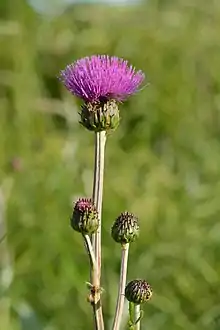Cirsium heterophyllum
Cirsium heterophyllum, the melancholy thistle,[1] is an erect spineless herbaceous perennial flowering plant in the family Asteraceae. It is native to Europe and western Asia, where it grows in upland meadows, grasslands, road verges and open woodland.[2]
| Cirsium heterophyllum | |
|---|---|
 | |
 | |
| Scientific classification | |
| Kingdom: | Plantae |
| Clade: | Tracheophytes |
| Clade: | Angiosperms |
| Clade: | Eudicots |
| Clade: | Asterids |
| Order: | Asterales |
| Family: | Asteraceae |
| Genus: | Cirsium |
| Species: | C. heterophyllum |
| Binomial name | |
| Cirsium heterophyllum (L.) Hill | |
| Synonyms | |
|
Synonymy
| |
Description
_clean%252C_no-description.jpg.webp)
Unusually for a thistle, Cirsium heterophyllum lacks spines. Growing 45–120 cm (18–47 in) tall, the plant forms creeping stolons (runners). The stem is grooved but unwinged, more-or-less branchless, and cottony. The leaves are green and hairless above, thick white-felted underneath. The basal leaves are lanceolate with petioles and softly prickly edges, and grow 20–40 cm (7.9–15.7 in) long, and 4–8 cm (1.6–3.1 in) wide. The upper leaves do not have petioles, clasping the stem with cordate (heart-shaped) bases. The flower heads are 3 to 5 cm long and wide, the flowers red-purple, appearing from July to August.[3][4][5]
Distribution
Cirsium heterophyllum is a species of northern Europe and Central Asia.[6] It is native in upland areas of Scotland and northern England and north Wales, but is rare in other parts of Great Britain and Ireland. It is present throughout Scandinavia, in north central Europe and Russia to about 100 degrees East and in the high mountains of southern Europe. It grows in upland grassland and scrub, open woodland and river valleys.[4]: 695
Similar species
Cirsium dissectum (meadow thistle) is a more slender species.
Medical use
The plant was considered a possible cure for sadness. Nicholas Culpepper in 1669 said that it "makes a man as merry as a cricket".[7]
References
- BSBI List 2007 (xls). Botanical Society of Britain and Ireland. Archived from the original (xls) on 2015-06-26. Retrieved 2014-10-17.
- Altervista Flora Italiana, Cardo con foglie variabili, Melancholy Thistle, Cirsium heterophyllum (L.) Hill includes photos and European distribution map
- Rose, Francis (1981). The Wild Flower Key. Frederick Warne & Co. pp. 382–383. ISBN 0-7232-2419-6.
- Stace, C. A. (2010). New Flora of the British Isles (Third ed.). Cambridge, U.K.: Cambridge University Press. ISBN 9780521707725.
- Blamey, M.; Fitter, R.; Fitter, A (2003). Wild flowers of Britain and Ireland: The Complete Guide to the British and Irish Flora. London: A & C Black. p. 290. ISBN 978-1408179505.
- "Den virtuella floran: Cirsium helenioides (L.) Hill". Retrieved 8 March 2017.
- Wildflowers of the British Isles